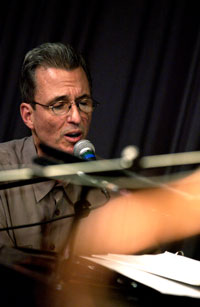"I try to emphasize learning many different styles of music, whether it be comping or improvising. I want my students to be versatile. That’s probably the most important thing, because versatility is key to being a good musician, being able to do all kinds of things."
"I bring in my experiences from outside the school because I want to prepare my students for what’s out there. I want them to know what to expect. When you’re in school it can be kind of mesmerizing, then you’re out and all of a sudden it’s, 'Gee, this is the real world.' I’ll tell them, for instance, that they should know how to do a certain thing in their chords because someday they might be out on a gig and someone might ask, 'Can you play this open voicing?' or say, 'I want this for my recording and that’s the sound I’m looking for.' I want my students to be ready for anything and everything out there."
"The main reason to study music here is the freedom that the college has with music. That goes along with the faculty. It’s open-minded, has a lot of different areas of music. That’s what attracted me to the school as a student. I liked jazz, I liked rock, and when I went to school I didn’t want just a classical conservatory. I saw that Berklee had different programs, and that’s the thing that attracted me and probably a lot of other students. The curriculum is huge—they can take arranging, composition, engineering, recording, and more. It’s pretty amazing. When I came to Berklee in the ’70s, there were only four majors, nowhere near what they have now for programs. You could almost go back to this school for 40 years and still find different areas to study. It’s massive."

